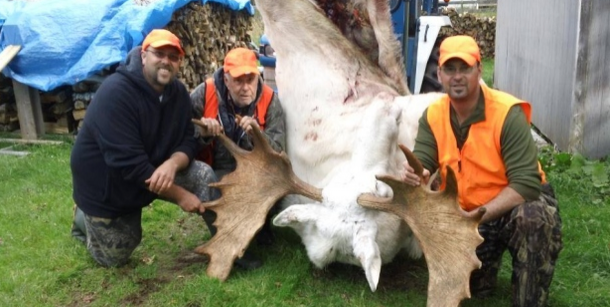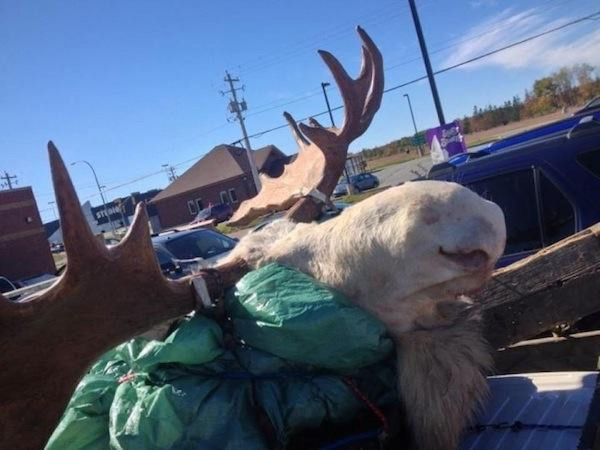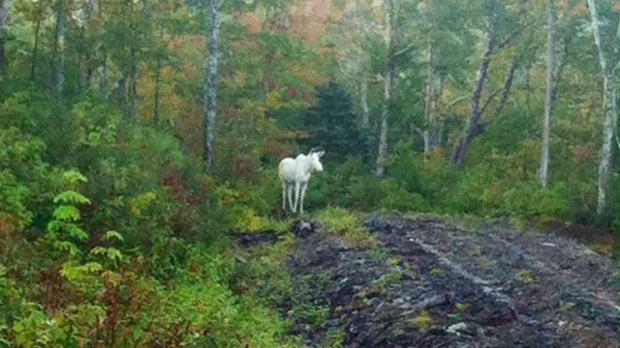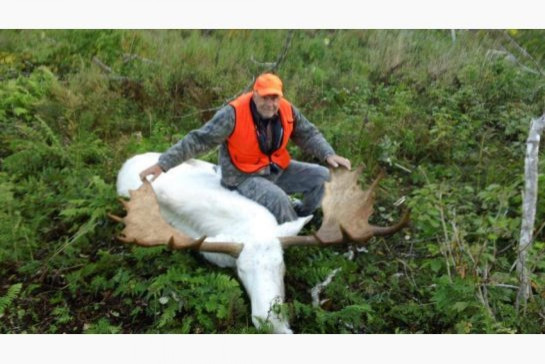Sacred White Moose Killed By Hunters In Canada, Mi'kmaq Community Outraged [PHOTOS]

When Canadian hunters shot and killed a rare albino moose last week, aboriginal communities were outraged. The white moose that was killed in Cape Breton, Nova Scotia, is considered a sacred animal among the Mi'kmaq people.
Hunters who shot the moose uploaded a photo onto Facebook that sparked controversy. "It was so disrespectful having seen it put on the social media, and it's been an outcry and our people are outraged," Mi'kmaq hunter Danny Paul told the Canadian Broadcasting Corporation.
While albino moose are rare there are no laws against killing them, according to Natural Resources Canada. But the Mi'kmaq say there is an unwritten law against slaying the animal.
"We know the significance and we've been teaching that to the non-native population for almost 500 years — about the importance that this and other white animals played in our lives," Paul said. "We are not to harm them in any way, shape, or form because they could be one of our ancestors coming to remind us of something significant that's going to happen within our communities."



White spirit animals are considered sacred and appear during difficult times, Emmett Peters, a Mi’kmaq elder, told Indian Country Today. “Every time I see something like that, it reminds me of integrity, courage, everything great in a leader,” he added.
At first, the hunters showed off their rare kill by snapping a photo and sharing it online on the Hnatiuk's Hunting & Fishing Ltd. Facebook page. The photos, which have since been taken down, showed the moose with the hunters. It was shared more than 1,000 times.
“Here they are sitting on a Native reserve with a white moose at the back of their truck at Tim Horton’s, showing off,” Brandon Maloney, a moose hunter who watched the hunters take the photo, said. “They were all happy and excited at first, they were bragging.”
Since the backlash surrounding the white moose’ death, the hunters have apologized and have returned the animal’s hide to the Mi’kmaq community.
“The hunters have shared that they regret, that unknowingly they caused this to happen,” Jim Hnatiuk of Hnatiuk's Hunting & Fishing posted on the company’s Facebook page. “These are good men and they broke no law, and they have expressed that it would have been nice to have known more about the significance of these white moose.”
The Mi’kmaq plan to honor the animal with a four-day ceremony next Thursday. “They’re going to set an altar where the hide will be. There will be offerings and there will be prayers,” Bob Gloade, chief of the Millbrook First Nation, told the CBC. “It’s a way of releasing the spirit of the animal back to its rightful place.”
Gloade adds that he hopes legislation will be passed to protect the sacred white moose in the future. “To recognize the importance and significance to the Mi’kmaq people is the next step moving forward, and it’s a way of building better relationships between the aboriginal and non-aboriginal community,” he said.
© Copyright IBTimes 2025. All rights reserved.





















